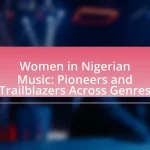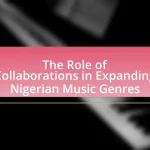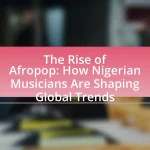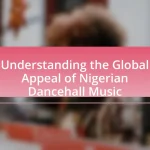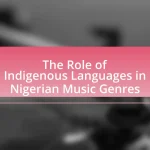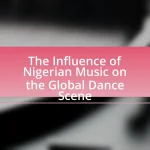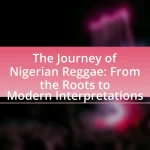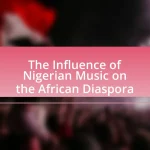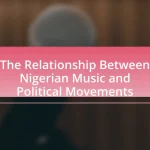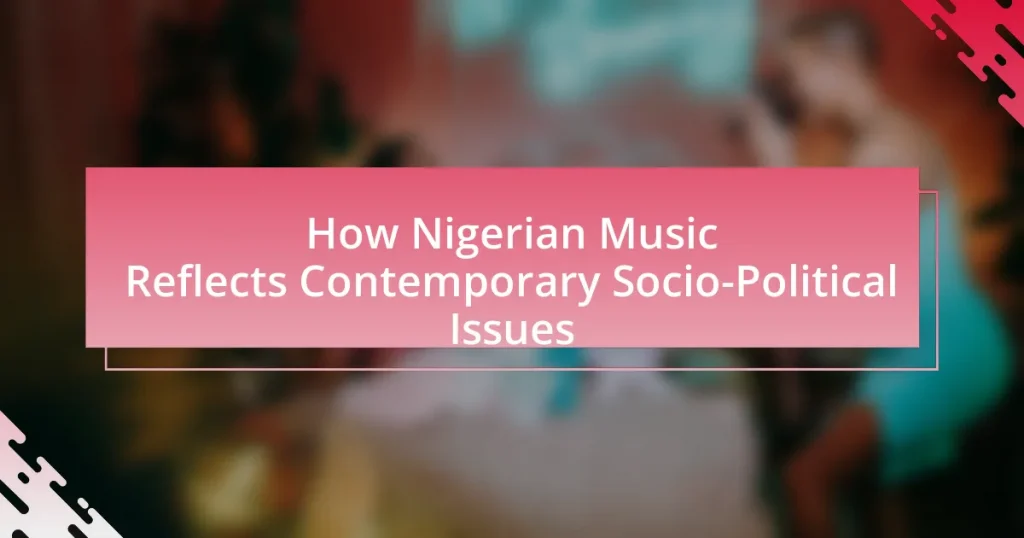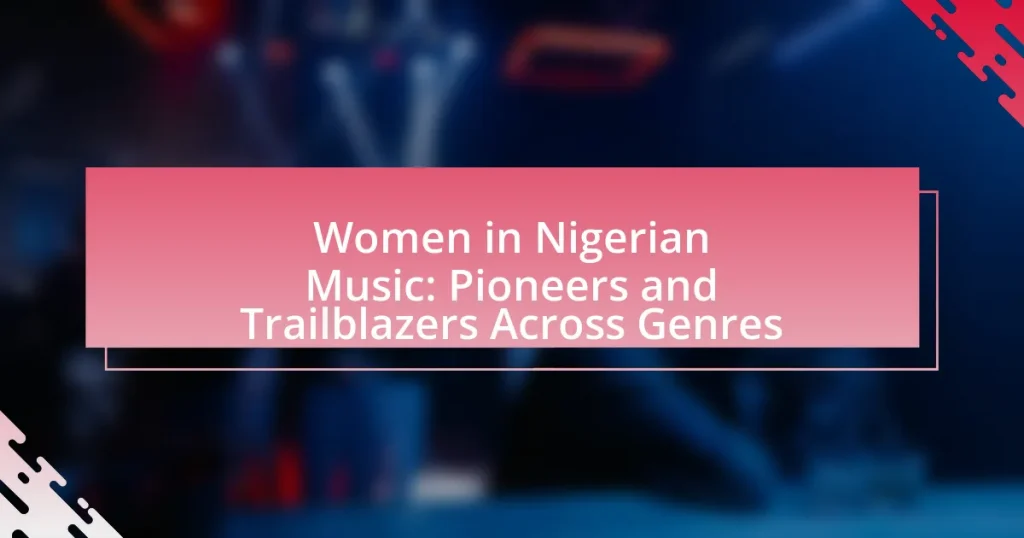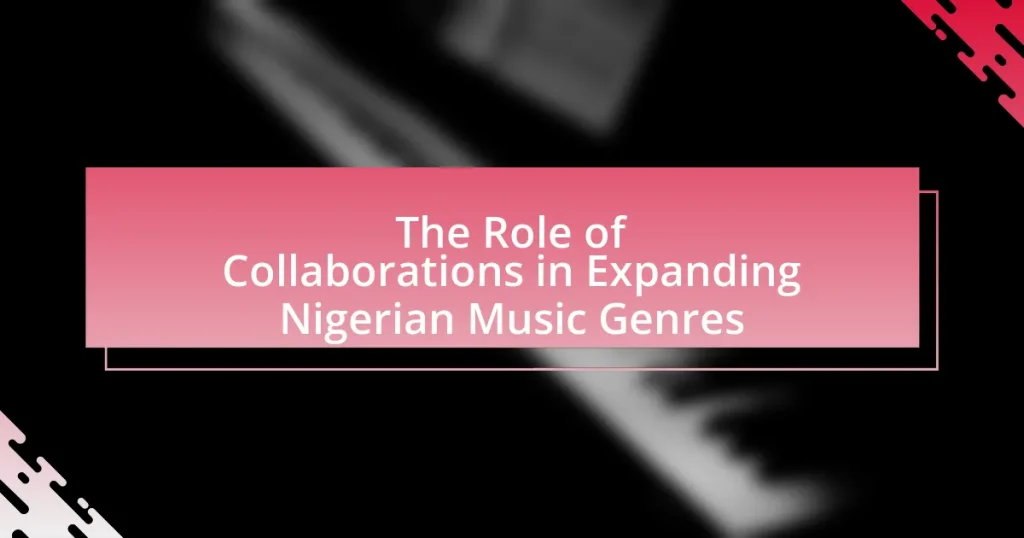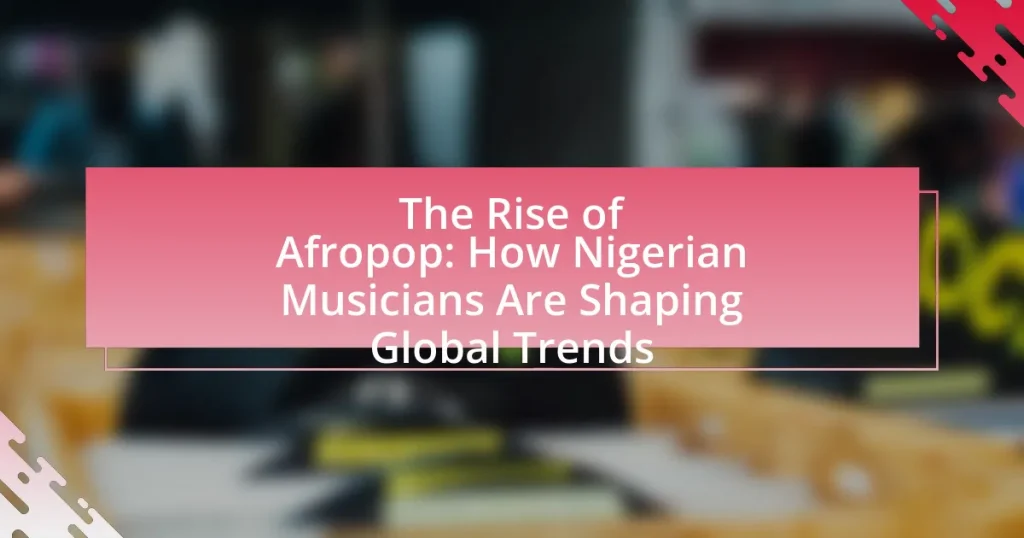Nigerian music serves as a significant reflection of contemporary socio-political issues, addressing themes such as corruption, social injustice, and the quest for democracy. Pioneered by artists like Fela Kuti, this musical tradition critiques government policies and human rights abuses, a practice continued by contemporary musicians such as Burna Boy and Wizkid. The article explores key socio-political themes in Nigerian music, including the role of music in activism, the impact of historical events on the music scene, and how genres like Afrobeats and Highlife respond to political climates. It also examines the influence of music on public perception of governance and the importance of audience reception in understanding music’s socio-political impact.
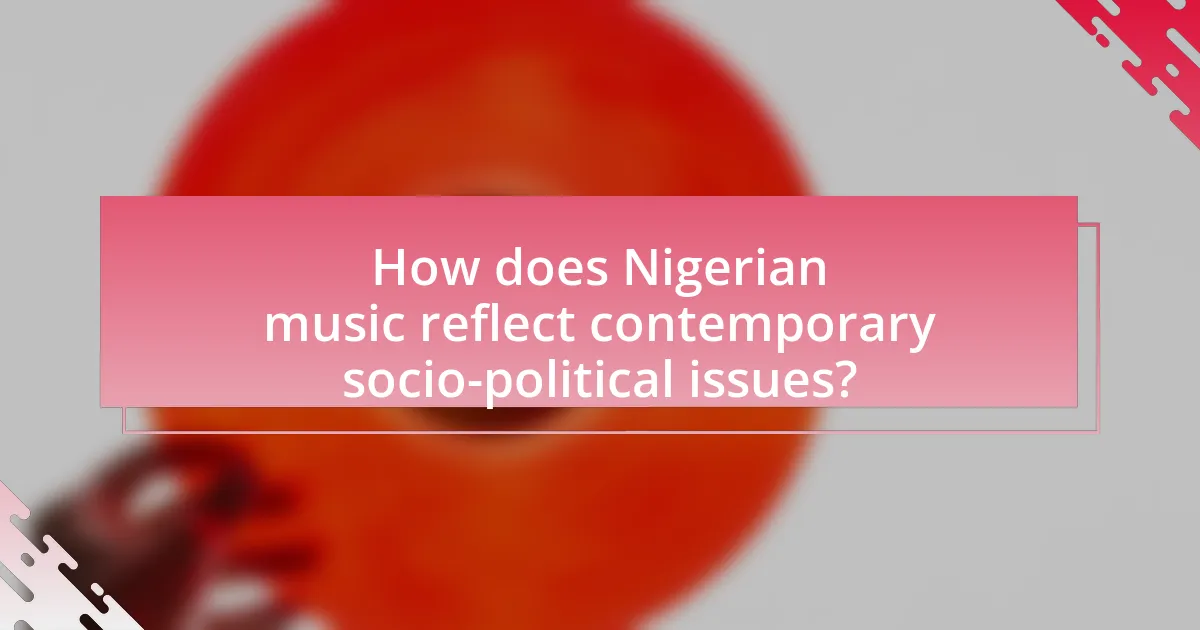
How does Nigerian music reflect contemporary socio-political issues?
Nigerian music reflects contemporary socio-political issues by addressing themes such as corruption, social injustice, and the struggles for democracy. Artists like Fela Kuti pioneered this approach, using Afrobeat to critique government policies and human rights abuses during Nigeria’s military regimes. Current musicians, such as Burna Boy and Wizkid, continue this tradition by incorporating social commentary into their lyrics, highlighting issues like police brutality and economic hardship. For instance, Burna Boy’s song “Monsters You Made” explicitly discusses the impact of systemic oppression on the youth, illustrating how music serves as a platform for activism and awareness in Nigeria’s socio-political landscape.
What are the key socio-political themes present in Nigerian music?
Key socio-political themes present in Nigerian music include corruption, social justice, and national identity. Corruption is often highlighted through lyrics that criticize government officials and systemic issues, as seen in songs by artists like Fela Kuti, who famously addressed the Nigerian military regime in the 1970s. Social justice themes are prevalent, with musicians advocating for human rights and equality, reflecting the struggles of marginalized communities. National identity is explored through the celebration of cultural heritage and the critique of colonial legacies, as demonstrated in contemporary genres like Afrobeats, which blend traditional sounds with modern influences to assert a unique Nigerian identity. These themes resonate with listeners, making Nigerian music a powerful medium for political expression and social commentary.
How do artists address corruption in their lyrics?
Artists address corruption in their lyrics by explicitly critiquing political leaders and systems that perpetuate unethical practices. For instance, Nigerian musicians like Fela Kuti and Burna Boy use their songs to highlight the detrimental effects of corruption on society, often referencing specific incidents or figures to illustrate their points. Fela Kuti’s song “Zombie” serves as a powerful indictment of the military regime in Nigeria, while Burna Boy’s “Another One” addresses the pervasive nature of corruption in governance. These artists employ vivid imagery and storytelling to engage listeners, making the issue of corruption relatable and urgent. Their lyrics not only reflect personal experiences but also resonate with the collective frustrations of the populace, thereby fostering awareness and encouraging social change.
What role does music play in activism and social movements?
Music serves as a powerful tool in activism and social movements by fostering unity, raising awareness, and inspiring action. Throughout history, songs have been used to convey messages of resistance and solidarity, such as during the Civil Rights Movement in the United States, where artists like Nina Simone and Bob Dylan created anthems that galvanized public support for social change. In Nigeria, contemporary musicians like Fela Kuti and Burna Boy address socio-political issues through their lyrics, highlighting corruption and advocating for justice. This use of music not only amplifies the voices of marginalized communities but also mobilizes individuals to participate in collective action, as seen in protests where songs become rallying cries.
How has the evolution of Nigerian music mirrored societal changes?
The evolution of Nigerian music has mirrored societal changes by reflecting the country’s historical, political, and cultural transformations. For instance, the rise of Afrobeat in the 1970s, pioneered by Fela Kuti, was a direct response to Nigeria’s political corruption and military dictatorship, using music as a tool for social activism and protest. Additionally, the emergence of contemporary genres like Afrobeats in the 2010s showcases the globalization of Nigerian culture and the youth’s desire for identity and expression amidst economic challenges and social issues. This evolution illustrates how music serves as a barometer for societal sentiments, capturing the struggles, aspirations, and dynamics of Nigerian society throughout different eras.
What historical events have influenced the music scene in Nigeria?
The music scene in Nigeria has been significantly influenced by historical events such as colonialism, the Nigerian Civil War, and the rise of military regimes. Colonialism introduced Western musical forms and instruments, which blended with indigenous styles, leading to the development of genres like Highlife and Juju. The Nigerian Civil War (1967-1970) deeply impacted musicians, as many used their art to express the pain and struggles of war, resulting in poignant songs that resonated with the populace. Additionally, military regimes from the 1980s to the 1990s stifled free expression, prompting artists to use music as a form of protest against political oppression, which gave rise to genres like Afrobeat, popularized by Fela Kuti. These events collectively shaped the evolution of Nigerian music, reflecting the socio-political landscape of the country.
How have genres like Afrobeats and Highlife responded to political climates?
Afrobeats and Highlife have responded to political climates by serving as platforms for social commentary and activism. Artists within these genres often address issues such as corruption, inequality, and government oppression through their lyrics and performances. For instance, songs like “This Is Nigeria” by Falz critique the socio-political landscape, highlighting the struggles faced by citizens. Additionally, Highlife music has historically been used to express dissent and mobilize communities, particularly during periods of political unrest in Nigeria. This connection between music and political expression underscores the genres’ roles in reflecting and shaping public discourse around contemporary socio-political issues.
Why is music considered a powerful tool for social commentary in Nigeria?
Music is considered a powerful tool for social commentary in Nigeria because it serves as a medium for expressing dissent and raising awareness about socio-political issues. Nigerian artists often address topics such as corruption, inequality, and human rights abuses through their lyrics, making music a vehicle for social change. For instance, the song “This Is Nigeria” by Falz critiques government negligence and societal issues, resonating with the public and sparking conversations. Additionally, the historical context of music in Nigeria, from the anti-colonial struggles to contemporary protests, underscores its role in mobilizing communities and influencing public opinion.
How do musicians use storytelling to convey political messages?
Musicians use storytelling to convey political messages by embedding narratives within their lyrics that reflect social injustices and political struggles. For instance, Nigerian artists like Fela Kuti and Burna Boy incorporate personal and collective experiences into their songs, addressing issues such as corruption, oppression, and human rights violations. Fela Kuti’s song “Zombie” critiques the Nigerian military’s brutality, using vivid imagery and metaphor to illustrate the plight of citizens. Similarly, Burna Boy’s “Anybody” addresses systemic inequality, employing storytelling techniques to resonate with listeners and inspire activism. These narratives not only engage audiences emotionally but also serve as a form of resistance and a call for change, demonstrating the power of music as a tool for political expression.
What impact does music have on public perception of political issues?
Music significantly influences public perception of political issues by shaping emotions, fostering solidarity, and providing a platform for political expression. For instance, protest songs in Nigeria, such as those by Fela Kuti, have historically galvanized public sentiment against government corruption and human rights abuses, effectively raising awareness and mobilizing action. Research indicates that music can enhance the emotional resonance of political messages, making them more relatable and impactful, as seen in the widespread popularity of songs addressing social justice themes during Nigeria’s #EndSARS movement. This demonstrates that music not only reflects societal issues but also actively participates in shaping public discourse and opinion on political matters.
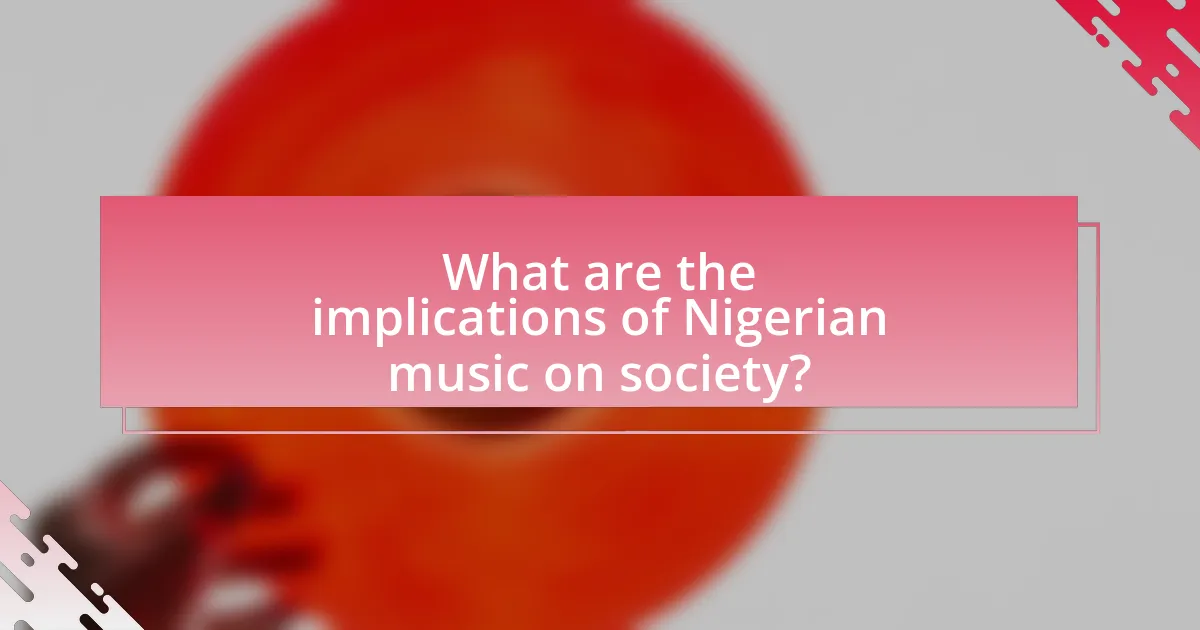
What are the implications of Nigerian music on society?
Nigerian music significantly influences society by shaping cultural identity, promoting social change, and reflecting socio-political issues. The genre serves as a platform for artists to address pressing societal concerns, such as corruption, inequality, and human rights abuses. For instance, the rise of Afrobeat, popularized by Fela Kuti, directly challenged governmental authority and highlighted social injustices in Nigeria during the 1970s and 1980s. Furthermore, contemporary artists like Burna Boy and Wizkid continue this tradition by using their music to comment on issues like police brutality and the #EndSARS movement, thereby mobilizing youth and fostering a sense of community and activism. This engagement illustrates how Nigerian music not only entertains but also acts as a catalyst for societal reflection and transformation.
How does Nigerian music influence public opinion on governance?
Nigerian music significantly influences public opinion on governance by serving as a platform for social commentary and political critique. Artists like Fela Kuti have historically used their music to address corruption, human rights abuses, and government accountability, shaping listeners’ perceptions and encouraging civic engagement. For instance, Fela’s song “Zombie” criticized the Nigerian military regime, galvanizing public sentiment against oppressive governance. Additionally, contemporary artists such as Burna Boy and Wizkid continue this tradition by addressing socio-political issues in their lyrics, which resonate with the youth and inspire activism. This musical discourse not only reflects societal frustrations but also mobilizes public opinion, as seen in the #EndSARS protests where music played a pivotal role in uniting voices against police brutality and demanding reform.
What examples exist of songs that have sparked political debates?
Songs that have sparked political debates include “Zombie” by Fela Kuti, which criticized the Nigerian military regime, and “This Is Nigeria” by Falz, which addressed issues like corruption and societal challenges. “Zombie” led to significant discussions about governance and military oppression in Nigeria, while “This Is Nigeria” prompted debates on social justice and the state of the nation. Both songs exemplify how music can serve as a powerful medium for political expression and critique in Nigeria.
How do listeners interpret political messages in music?
Listeners interpret political messages in music by analyzing lyrics, context, and the artist’s intent, often relating them to their own experiences and societal issues. For instance, Nigerian music frequently addresses themes such as corruption, governance, and social justice, allowing listeners to connect these messages to their lived realities. Research indicates that music can serve as a form of protest and a catalyst for social change, as seen in the works of artists like Fela Kuti, whose songs critiqued the Nigerian government and resonated with the public’s frustrations during military rule. This connection between music and political sentiment illustrates how listeners actively engage with and derive meaning from political messages in songs.
What role do music festivals and concerts play in socio-political discourse?
Music festivals and concerts serve as platforms for socio-political discourse by facilitating dialogue and raising awareness about pressing social issues. These events often feature artists who use their music to comment on political situations, mobilize communities, and inspire activism. For instance, the “One Africa Music Fest” has highlighted issues such as corruption and human rights abuses in Nigeria, engaging audiences in discussions about governance and societal change. Additionally, concerts like “The End SARS Concert” in 2020 directly addressed police brutality and youth activism, demonstrating how music can unify voices and amplify calls for justice. Such events not only entertain but also empower attendees to reflect on and engage with socio-political challenges.
How do these events promote awareness of social issues?
Events in Nigerian music promote awareness of social issues by using performances and lyrics to address topics such as corruption, inequality, and human rights violations. For instance, artists like Fela Kuti have historically used their music as a platform to critique government actions and societal injustices, effectively raising public consciousness. Additionally, contemporary events like concerts and music festivals often feature discussions and collaborations that highlight pressing social issues, engaging audiences and fostering dialogue. This engagement is supported by the widespread reach of music in Nigeria, where it serves as a unifying force that can mobilize communities around social causes.
What is the significance of collaborations between artists and activists?
Collaborations between artists and activists are significant because they amplify social messages and foster cultural change. Artists use their platforms to express and disseminate the causes championed by activists, creating a powerful synergy that can reach wider audiences. For instance, Nigerian musicians like Fela Kuti have historically collaborated with activists to address political corruption and social injustice, effectively using music as a tool for advocacy. This partnership not only raises awareness but also mobilizes communities, as seen in the #EndSARS movement, where artists played a crucial role in rallying support against police brutality in Nigeria. Such collaborations enhance the impact of social movements by merging creativity with activism, leading to greater visibility and engagement in socio-political issues.
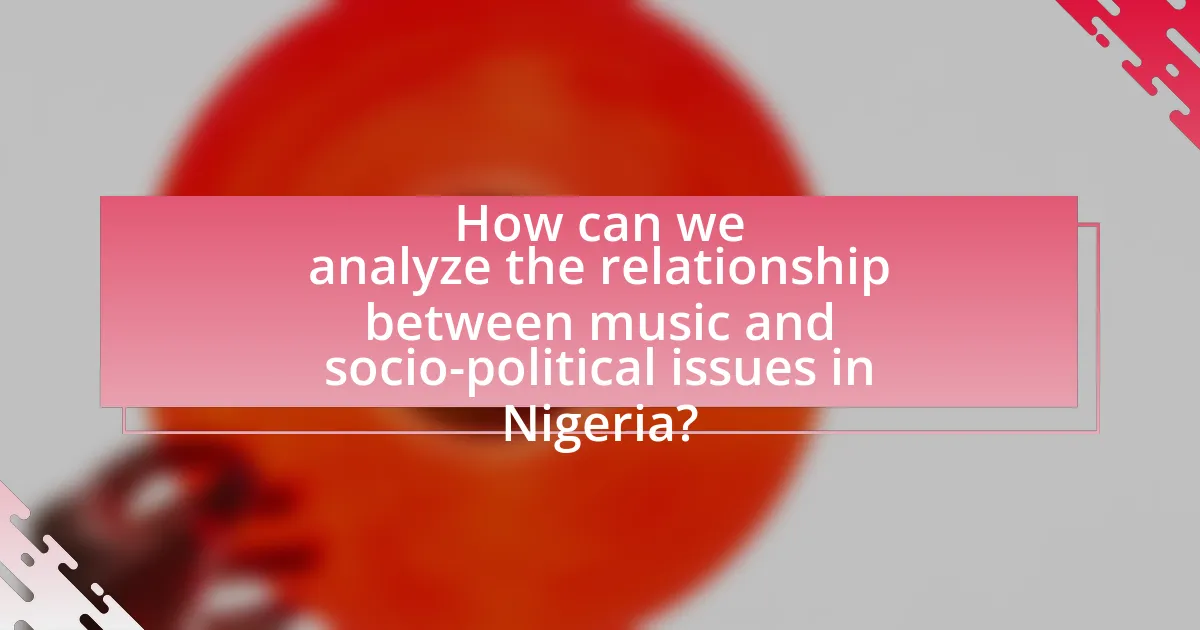
How can we analyze the relationship between music and socio-political issues in Nigeria?
To analyze the relationship between music and socio-political issues in Nigeria, one can examine lyrical content, artist activism, and public reception. Lyrical content often reflects societal grievances, as seen in songs addressing corruption, inequality, and governance failures. For instance, Fela Kuti’s music directly criticized the Nigerian government and military regimes, influencing public discourse. Artist activism, such as performances at protests or collaborations with social movements, further illustrates this connection. The public’s reception of music, including its role in mobilizing youth during movements like #EndSARS, demonstrates how music serves as a catalyst for socio-political awareness and change. This multifaceted approach reveals the intricate ways music interacts with and influences socio-political landscapes in Nigeria.
What methodologies can be used to study Nigerian music’s socio-political impact?
Qualitative research methodologies, such as ethnography and interviews, can be used to study Nigerian music’s socio-political impact. Ethnography allows researchers to immerse themselves in the cultural context of Nigerian music, observing performances and community interactions, which provides insights into how music reflects and influences socio-political issues. Interviews with musicians, listeners, and cultural critics can reveal personal narratives and interpretations of music’s role in political discourse. Additionally, content analysis of song lyrics and music videos can quantitatively assess themes related to social justice, governance, and identity, providing concrete evidence of music’s socio-political commentary. These methodologies collectively enable a comprehensive understanding of the intricate relationship between Nigerian music and its socio-political environment.
How can lyrical analysis reveal deeper societal concerns?
Lyrical analysis can reveal deeper societal concerns by examining the themes, language, and narratives present in the lyrics, which often reflect the socio-political climate. For instance, Nigerian music frequently addresses issues such as corruption, inequality, and social justice, providing insight into the collective consciousness and frustrations of the populace. An example is the song “This Is Nigeria” by Falz, which critiques government negligence and societal issues, illustrating how artists use their platform to voice dissent and raise awareness. Such lyrical content serves as a mirror to societal challenges, enabling listeners to engage with and understand the underlying issues affecting their communities.
What role does audience reception play in understanding music’s impact?
Audience reception is crucial in understanding music’s impact as it directly influences how music is interpreted and valued within a socio-political context. The way audiences respond to music can reveal insights into their cultural, social, and political sentiments, thereby shaping the music’s significance and effectiveness as a form of expression. For instance, Nigerian music often addresses contemporary socio-political issues, and audience reactions can highlight the resonance of these themes within society. Research indicates that audience engagement with music can lead to social movements, as seen in the #EndSARS protests in Nigeria, where music played a pivotal role in mobilizing public sentiment against police brutality. This demonstrates that audience reception not only reflects the music’s impact but also actively contributes to its role in societal change.
What are some notable case studies of Nigerian music addressing socio-political issues?
Notable case studies of Nigerian music addressing socio-political issues include Fela Kuti’s “Zombie,” which critiques the Nigerian military’s brutality and oppression, and Burna Boy’s “Another One,” which highlights the struggles against police brutality and systemic injustice in Nigeria. Fela Kuti’s work, particularly during the 1970s and 1980s, directly challenged the authoritarian regime of the time, leading to his arrest and the destruction of his home. Burna Boy’s recent music, especially in the wake of the #EndSARS protests in 2020, resonates with the youth’s demand for accountability and reform, showcasing the ongoing relevance of music as a tool for social change in Nigeria.
How did Fela Kuti’s music challenge the status quo?
Fela Kuti’s music challenged the status quo by directly addressing political corruption and social injustices in Nigeria through his Afrobeat genre. His lyrics often criticized the Nigerian government and military dictatorship, exemplified in songs like “Zombie,” which condemned the military’s brutality and blind obedience. Kuti’s performances were not just musical events; they were political statements that mobilized public consciousness and encouraged activism against oppressive regimes. His establishment of the Kalakuta Republic, a commune that served as a base for his music and political activism, further exemplified his defiance against societal norms and government authority.
What contemporary artists are leading the charge in socio-political commentary?
Contemporary artists leading the charge in socio-political commentary include Burna Boy, Fela Kuti’s legacy, and Santi. Burna Boy addresses issues such as police brutality and systemic inequality in Nigeria through his music, notably in songs like “Monsters You Made,” which critiques government failures. Fela Kuti, though not contemporary, continues to influence modern artists with his Afrobeat genre, which was rooted in political activism against corruption and oppression. Santi, through his genre-blending style, also tackles themes of identity and societal challenges in Nigeria, reflecting the struggles of the youth. These artists utilize their platforms to raise awareness and provoke thought on pressing socio-political issues in Nigeria.
What practical steps can musicians take to address socio-political issues through their art?
Musicians can address socio-political issues through their art by creating songs that highlight specific injustices, using their platforms to raise awareness, and engaging in community activism. For instance, artists like Fela Kuti have historically used music to critique government corruption and social inequality in Nigeria, effectively mobilizing public sentiment. Additionally, musicians can collaborate with NGOs to amplify messages related to human rights or environmental issues, as seen in campaigns like “Music for Change,” which leverage the influence of artists to promote social justice. By integrating storytelling and personal experiences into their lyrics, musicians can foster empathy and provoke thought, encouraging listeners to engage with socio-political topics critically.
